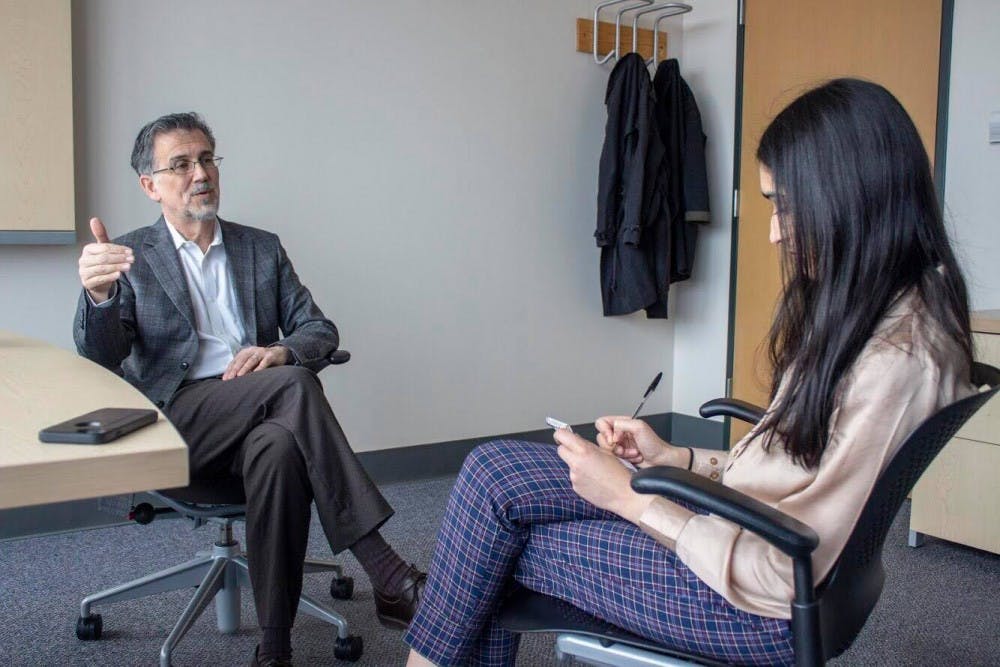David Fathi has led prison reform across the United States, was the director of the U.S. Human Rights Watch and advocated for the United Nations to adopt the “Nelson Mandela Rules,” which revised the minimum standards for the treatment of prisoners worldwide.
Fathi, the director of the American Civil Liberties Union National Prison Project, spoke to a room full of UB and Buffalo community members on Wednesday evening in O’Brian Hall, and discussed prison reform with students of the Daniel Acker Scholars Program on Thursday morning.
He visited UB two weeks after students from UB’s Pre-Law Chapter of Black Law Students Association partnered with Campaign for Alternatives to Isolated Confinement to stage an exhibit demonstrating against solitary confinement in New York State.
Fathi discussed prison reform, solitary confinement and his current case against the state of Arizona with The Spectrum on Thursday afternoon.
Q: Can you think of one specific point in time where you decided this is what you wanted to do?
A: Well, my first exposure to prison work was when I was a law student in the late ‘80s in Berkeley, California. And I did some volunteer work on the case of a man named Geronimo Pratt, who had who was a member of the Black Panther Party, who had been framed for murder that he didn't commit. And that was my first exposure to prison… I just hadn't thought much about prison to the prisoners. That was my first time in a prison. Geronimo in that time was in San Quentin State Prison, which is just outside of San Francisco. And it really opened my eyes blew my mind, rocked my world. Just the sudden realization that we do this to so many people for such a long period of time.
Q: Yesterday you were talking about how Portugal eliminated laws against people who use drugs. What is a model of prison reform that America should follow?
A: If we simply ran our prisons, the way all of our peer nations do, you know — Canada, U.K., France, Germany — that would be a huge improvement. It would mean cutting our population dramatically. We have an incarceration rate that's five to 10 times higher than Canada and the countries of Western Europe. It would mean having much shorter sentences. The United States has very long sentences for for the same crime. It would result in doing away with the sentence of life without parole, which most of our peer nations have done away with. So there are plenty of models out there. We don't have to look far. There's no reason that we have to lock up six times as many people in this country about a political choice we've made and we could make a different political choice.
Q: You also discuss racial bias in the criminal justice system. There are a lot of laws that are always recognized in that arena, such as the higher sentences for crack cocaine versus powder cocaine and that’s a really famous law that people cite. But is there one that doesn't get as much attention -- alaw that people may not know about, but that you think is having the same effect?
A: There's two main things going on here. One is one is laws that like the 100-to-one now it's only the 18-to-one crack-to-powder cocaine disparity that is a deliberate targeting of African Americans.
But then there's the racially discriminatory enforcement of facially neutral laws that on their face apply to everybody, but are enforced much more harshly against African Americans. And that happens at every step of the criminal justice system. It starts with policing, where the police decide to go, who they decide to arrest versus not arrest. It starts with the charging decision that's made by the district attorney — do you charge this or not— or do you charge them with a felony or misdemeanor and it continues with the decisions that juries make who juries believe and find not guilty or disbelieve and find guilty. And it continues with the sentencing decision that the judge gives. Does the judge give a long sentence or a short sentence?
So at every stage of the criminal justice system where discretion is exercised, we see that discretion being exercised to the detriment of people of color. And so that's a big part of the reason why we end up with the gross over representation of people of color in prisons and here in New York State, African Americans are eight times more likely than whites to be in prison.
Q: There was recently a demonstration against solitary confinement on the day Angela Davis visited UB. Flyers were handed out explaining the HALT bill — which you endorsed yesterday — and why it was better than Governor Cuomo’s bill on solitary confinement. Why do you endorse the HALT bill over Gov. Cuomo’s?
A: Unfortunately, I don't know the minutiae of the two bills, but the ACLU is supporting the HALT Solitary Confinement Act which would bring New York in line with the the United Nations’ standards set forth in the the Nelson Mandela rules — which says that no one can be held in solitary confinement for more than 15 days. It would also exclude certain vulnerable populations from solitary confinement: young people, older people, pregnant women, and so on.
Q: You said you usually go to states that don't have as many resources as New York does. What state have you been to that was in dire need reform and resources?
A: States like New York and California, they're pretty well resourced. So we tend not to work in those states, we tend to work in I guess — if you could generalize — the the non coastal states, where there really is no one else to do this work except us. So we're working in Arizona and we also have a case in Nebraska. And in both of those states, if we hadn't brought the case, nobody else would have. There just aren't the kind of resources that there are in New York and California and states like that.
Q: What kind of resources?
A: Lawyers who have the expertise to do this kind of work. Lawyers who have the financial backing to bring, you know, a big and expensive case that will take years to litigate. So, for example, in Arizona, we represent what's called a class action where we represent all the prisoners in the state prison system. So we have 34,000 clients, that's that's a big case. And you need a certain number of lawyers, you need a certain amount of financial backing to undertake a case like that.
Q: Who financially backs the ACLU?
A: We take no government money whatsoever, because much of what we do is sue the government so we can't take their money. We get grants from foundations, but much if not most of our money comes from individual supporters, people who can become a member of the ACLU for $20 a year. A lot of people give us more than that. Some people give us a lot more than that.
Q: On your blog, you spoke about Walter Jordan, a prisoner in Arizona, and just now you spoke about Geronimo Pratt. Is it usually these single stories that draw you to a certain state?
A: Well there will be the individual stories that are sort of like an indicator. If we see people who, like Mr. Jordan, had an entirely treatable condition that was ignored so that he died a horrifying and unnecessary death. That's certainly a sign that there's problems in the system, but we never go into a state based on one case. We do a very thorough investigation, we look at staffing, do they have enough doctors? Do they have enough nurses? We look at how many prisoners have died in the last year, how many prisoners have died by suicide? So we really do a very systematic analysis before we before we bring a lawsuit because the Arizona case was filed in 2012, these are these are multi year commitments. And so we we choose our targets carefully.
Q: You regularly in your blog talk about how privatizing present systems or even privatizing the health care that's provided in the systems is bad for prisoners. Why do you think nationalizing prisons would be beneficial?
A: First of all, it’s still the case that most prisoners, over 90% of prisoners are in publicly run prisons that are run by either the federal government or a state government or a county government and I'm certainly not going to say those are all great because they're not some of them are truly horrific.
The problem with private prisons is their whole selling point, the whole reason that private prisons is they say, ‘We can do it more cheaply.’ You know, we can lock people up more cheaply than the government can, and at the same time, generate a profit for our shareholders. And there's really only one way to do that. And that's to cut costs. That's the cut costs on staffing, cut costs on health care costs on security, cut costs, on food cut costs in every conceivable area. And usually when you have out here in the free world, when you have companies that provide bad service whose whose services injure or kill people, people stop using those companies, and they eventually go out of business. But those market forces don't work in the prison context. Because the prisoners have no consumer choice, the prisoner can't say, Wow, this prison is really terrible, I'm going to go down the road, other prison, and maybe it's better there. So you have these companies that have every incentive to cut corners that are pretty insulated from the market forces that normally punish bad corporate behavior. And so it's, it's a structural risk of bad outcomes, bad outcomes at the expense of a powerless, literally, captive population that has no consumer choice. So that's why we oppose private prisons, not because public prisons necessarily wonderful.
Q: As someone who became interested in this field after experiences at law school, what is your message to UB students who are also interested in prison reform and the students who staged the demonstration against solitary confinement two weeks ago?
A: My message is do something that matters to you, whether it's prison reform or police reform or working for decent housing or working for decent public schools, make your life matter — do something that matters to you.
Tanveen Vohra is a co-senior news editor and can be reached at tanveen.vohra@ubspectrum.com and on Twitter @TanveenUBSpec
Tanveen Vohra is a former senior news editor and covered international relations and graduate student protests.






